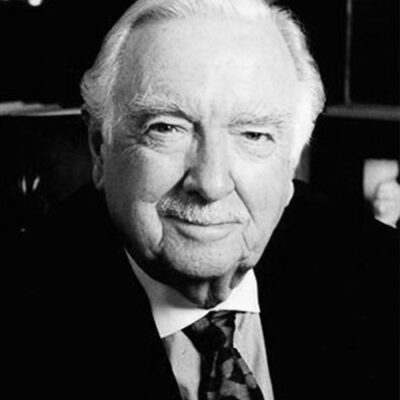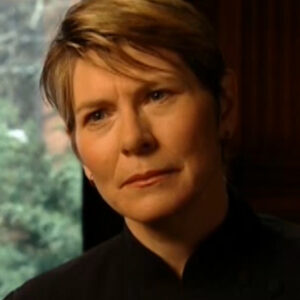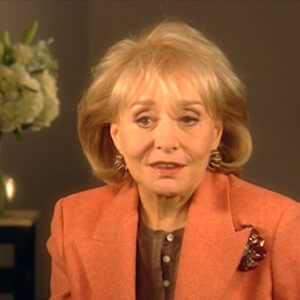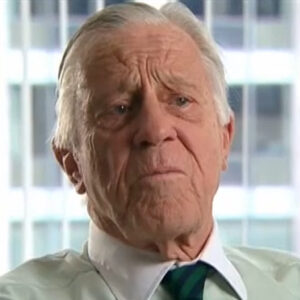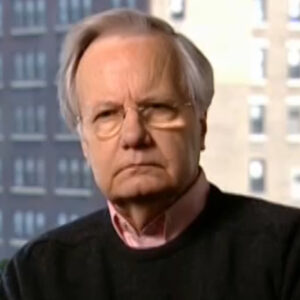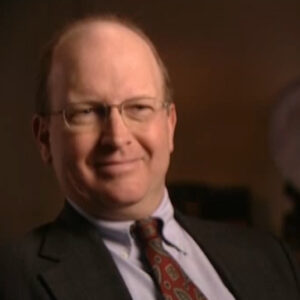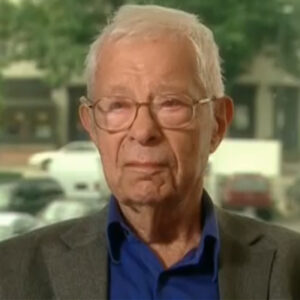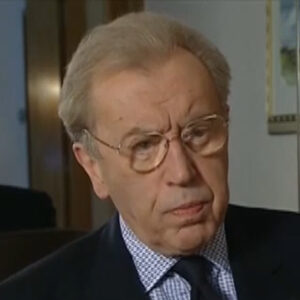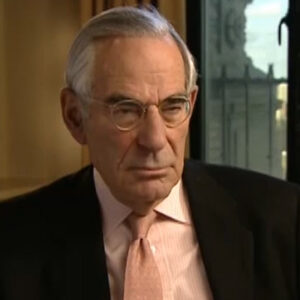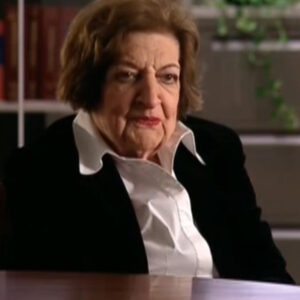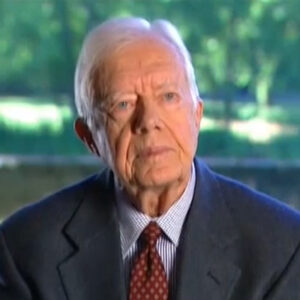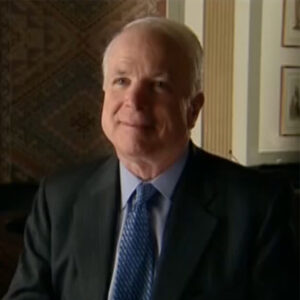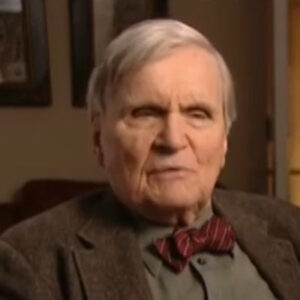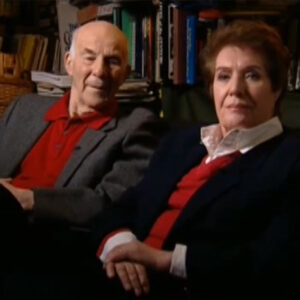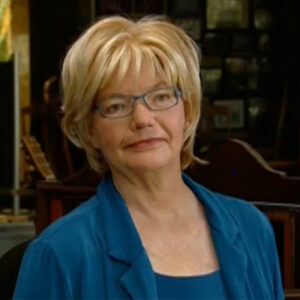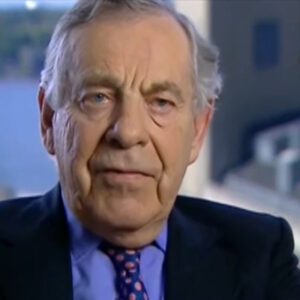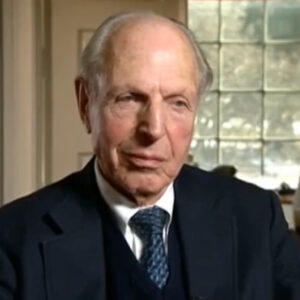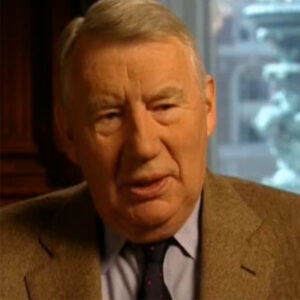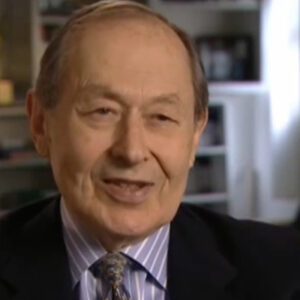Interviewer: Tell me a little bit about. Were you a musician? I mean, did you study music? Why? How is it that you end up conducting orchestras and choirs?
Walter Cronkite: Oh, just musically brilliant. I think I. I did have a little piano lessons in my early days, as a matter of fact. Got a pretty good rating at a junior group in Kansas City when I was at the piano. Then I persuaded my parents to let me take up the saxophone, which was a terrible mistake. I should have stayed with the piano. You hardly ever have a saxophone out to entertain your friends, although I guess President Clinton did that. Clinton Clinton did that.
Speaker But I’ve always been interested in band music. March with the band and played with the band. I just have a natural talent, I guess, to lead a band, and I love it. I would if I could take that up with occupation, I would certainly do so.
Speaker Now, you were born in St. Joseph, Missouri. How did being born in. How did being from the Midwest. Shape your life. What? Was there anything about that being from that part of the world?
Speaker Well, I think I was lucky to be from that part of the world. I am from Texas. We moved to Texas to Houston when I was 10 years old and the rest of my formative years were there. I think there is a certain dilated to to the to the to our people in the Middle West and and to a somewhat lesser but still an important point that NSW, my family and Kansas City, my grandfathers. They’re all professional people to a degree. My grandfather was a dentist by one side, my grandfather on the other side, a pharmacist and drug store. So I think there is something there that is not has not been since the middle of the 19th century, contentious at all. It is this rather well settled in and the people have their views of things, but they don’t go about shouting them in the streets. It’s it’s a it’s a comfortable sort of life.
Speaker Is there any one object or thing that sort of evokes the memory of that time? I mean, like the steam train in those early days? Is there something or something in your grandfather’s drugstore, some smell or something that describes that you would say? This reminds me of that time, something unique about that time?
Speaker Well, I was very lucky as a child in the early stages and right up to the time I was 10 years old, living in Kansas City and partly St. Joe, my grandfather, the dentist was at St. Chettle. I had a lovely house, lovely place. It was a civic leaders, a matter of fact, quite, quite an important one in Kansas City. My druggists grandfather had a drugstore right on what was called the hospital hill. There were three hospitals, right. And one great several block groups there in Kansas City. And it overlooked the liver. Being mom on your monument, a rather famous because one of the few, in fact, I read just recently is the only existing monument to the soldiers of World War One. Believe it or not. And it’s quite a elaborate thing. But from that hilltop of my grandfather’s drugstore, what was I delivering for the drugstore when I was just seven or eight years old? To the hospitals, interestingly enough, mostly cigarettes. It was later. They were always ordering cigarettes in the hospital and the hospital permitted them to use. The whole idea of tobacco being cancer of danger hadn’t arisen yet. But back to the cigarettes was fifteen cents and everybody gave me a quarter. So I made a pretty good profit to the cigarettes, to hospital bill. And from hospital little I could look down at Union Station, which was a huge real well railway yard was a lot of freight, but mostly passenger trains. All the pastor cranes reach the West, went through Kansas City and they were always a Chappellet for a trial.
Speaker I couldn’t wait to get down to Capitol Hill looking down into the railway yard and watching the Express’s coming in, stopping the loading, unloading. It was fascinating from Hospital Hill. I can also look down on Liberty Hill there with a monument and watch the parades on Armistice Day. So I had a whole kind of a sample of America there growing up. And it was, I think, helpful sort of as setting a tone for the life I had for many, many years.
Speaker Mr. Clarke, I want to take a little bit of water, drink a little water. I think that will help you a little bit.
Speaker Was that usable? Oh, yeah, that was perfect.
Speaker If this doesn’t work in Stop man, I’ll get the on.
Speaker No, no, I just I just see how the water goes. When you looked on those trains and the passenger trains as a boy, did you have sort of fat? What kind of fantasies did you have about what life would be like?
Speaker You know, I don’t really remember fantasy in that sense. Life was too busy for me to begin thinking very heavily into the future. I don’t really recall thinking about it very much. Each day it was its own little challenge, and that was enough to keep me occupied.
Speaker When you talk about challenges, what kind of challenges for a young child did you have other than just playing? Growing up?
Speaker Well, growing up seemed to take quite a lot of my time. Tumi.
Speaker This may be actually warm water. Let’s see if we should maybe give you a little tea. Do you like tea? No. Yeah, maybe we can. Anna, maybe you can get some tea from Mr. Conchi, please.
Speaker In fact, the warm water is good as Marlene here. She’s not asking for a lozenge or lozenges or Earlene.
Speaker Do you have a little threat was right there. There, perfect. Thank you. We just give them give him a little hot water.
Speaker Yeah, just give him great work.
Speaker Here you go. I love those.
Speaker I won’t finish, so was just a really simple moment. Let me get your Kleenex.
Speaker That’s better than. We have speed stanback.
Speaker You called in your autobiography, recorded its life, but what about your early pre reporters life? Are there things that you remember that you wish you could see again? Things have changed so much, but are there some things that you would really love to see again?
Speaker Well, if I had the opportunity to return to those days, I would certainly do it. I remember them mostly as being the kind of daily challenges that normal everybody has. But then great satisfaction in being in my grandfather’s drugstore and visiting my other grandfather and his office in, say, July.
Speaker It was I had a very happy life at that time. Why my father wasn’t rich by any means.
Speaker None of the family were very rich. Not an unimportant Richard, all of a matter of fact. My grandfather at the drugstore always was having a little problem. He was in the middle of having to resist the chain drugstores, which first began in Kansas City, one of the major ones. And that gave him a terrible time. And we worried about his situation. I was aware of it, but not, of course, really in an adult sense.
Speaker I just knew that grandfather had some problems. But the my father was doing all right in his practice. We weren’t rich by any means. We were very middle class family from a middle class household. We had a cottage in Kansas City. I went to school climbing a hill back through the backyards of other houses in the area. What’s one terrible experience? Really an awful one. I don’t know how old I was, possibly eight or something like time going to school and I fell into a snowbank. Some of the houses had garages was deep in France as I drove into the thing. And I, I fell in one of those. I thought I was going to die. I couldn’t get out of it.
Speaker Nobody heard me out in the freezing and that darn thing. So you almost lost the interview many years ago.
Speaker That would have been about 19, 20, 25. What about an interesting year?
Speaker Twenty four seven year old boy drys an untended driveway.
Speaker Then when you were in a local newspaper reporter who came to teach a class in journalism at San Jacinto High School in Texas, how did how did that man change your life?
Speaker Oh, completely. I think Fred Bernie was his name and he was brilliant. He was one of mine. He had retired as a city editor for one of the papers in Houston, and he decided that there ought to be junior, ought to be a journalism classes for young people in high school. Nobody, I think, had any of those in the country. I think he must have been a pioneer or journalism school as a course in journalism classes in college, but not in high school. But Fred, Bernie just happened to be five high schools and use that time. And he went to one of each of the five days and was a brilliant teacher and a great man of inspiration. He loved the profession himself. He transferred that feeling he has to us. And several of us became a professional journalist in later years.
Speaker Now, why were you attracted to that course? Was that it required requires course or was it an elective?
Speaker Well, it was it was a must have an elective, I’m sure a lot of them must have been elected, but the we had a high school newspaper, a campus club for some reason. I wanted to be there. I don’t know why. Oh, I do know why. It all started with my reading. There were a boys book, Boys Lives for American Boys. There were two of them. One of them had articles every month on a different profession or business to try to inspire the young people to take some interest in something in the future. And the story of a foreign correspondent absolutely gripped me. And I must have been no more than ten, eleven years old at the time. And I would have said at that time, that’s what I want to be, was a foreign correspondent. I never really thought I had a shot at being a foreign correspondent. It was just kind of a dream. But when when Fred when my friend group came to Sanders at a high school with a journalism class, I was one of the first to sign up and I never looked back.
Speaker Now has to be a.
Speaker OK, let’s try.
Speaker Did he have. Was there a kind of philosophy or a certain message that he transmitted to us other than the enthusiasm of journalism? Did he have a message or a philosophy about what your journalism should be?
Speaker Well, he was a walking philosophy of journalism. He loved the business himself. He just believe that others ought to have the opportunity to work in this field that had changed him for all of his life. Now, as I could tell.
Speaker That’s great. I am so interested in the fact that there are stories in your book about how you chase. You know, you were chasing fires and then you were reporting, for example, this one story where you went and took a photograph. You walked into someone’s home. No one was there. And you took the photograph. Oh, really? It seems like this was a passion. So you were ready for that young, you already felt that somehow this was where you wanted to go?
Speaker Oh, absolutely, I did. I read the magazine page. Imagine what I must have been around 10 years old. So I held on to until I got to high school and I had this opportunity, which I never really expected to have. But from there on, there was a single course. I never even thought of anything else.
Speaker Now, you gave up college, you went to University of Texas, and then you decided to go to work as a newspaper man. Why did you give up your education for reporting? Didn’t you think that the education was important for your background as a reporter?
Speaker I felt that education was quite important and it was a good education, was that Texas was a very good university and it had a daily newspaper on which any journalism students work. So I had everything that anybody could ask for except that I was my my father was not doing terribly well financially. It was a depression years early depression. You’re just beginning. My father wasn’t doing that well. I really needed to augment my supply and living expenses somehow or other. So I had an opportunity to be hired at the state capital. What’s one of the state capital told journalism units. And I took it. I was there only a short while when I realized that I felt probably made a serious mistake, that I was learning a lot more there and practicing daily journalism, particularly a state capital with all those stories that are immediately available everyday and pressure you every day. And I just began to run out of time. It was what happened. I didn’t have time for both. And I chose to stay with the work where I was making enough to live on, but with the anticipation that I probably would go back to the university someday. But as we all know, drove the professional field is pretty heavy. It just never let me lose.
Speaker But certainly journalism has been a huge education. No. Sure. You are no. No was as good.
Speaker Don’t. Don’t mistake Staker. I miss.
Speaker Do you want to suck on the cap? No. Don’t try that again. You still have. Stop tape, please.
Speaker Maybe it’s not all a massive education.
Speaker OK. OK, so you were do you. Did you do you regret not having.
Speaker There’s been rarely a day. I haven’t regretted it very much. There’s a depth of education that I never achieve, really. I’ve done a Spencer reading and I feel that I’ve done it not a bad job of self education, but I could have done better if I had spent another two years in college.
Speaker But you were always known as a journalist who always was extraordinarily well-prepared. How did that come out of experience? Did you ever have a terrible experience where you were unprepared and not knowing what to do?
Speaker I think I probably had several of those.
Speaker As I began to really acquire and understand the the techniques required, good journalistic coverage of anything I was learning as I work. And I did a lot of research at that time. There wasn’t a lot of research to be done on any particular story that time that didn’t come along until television.
Speaker And we were actually doing entire programs with a lot of planning in advance, of course, for the filming and so forth. That was when I really began that a real heavy research situation the most my.
Speaker I’m sorry. Why did you take this close and stop, stop tape, please?
Speaker Speed, speed. OK.
Speaker And why of formative years work into the state capital, particularly of the then on the newspaper was my daily tutor. Right. So for the newspapers and therefore built fairly, fairly extensive, I think, knowledge for a young man still in his late teens. That’s his follow me through my life. Of course, all news knows people who have important assignments, spend a lot of time with the newspaper and what their colleagues are writing. And I learned to be my basic source of knowledge.
Speaker But did you ever have an experience where you were not prepared? You have to sort of I mean, did you ever have that situation where you were not prepared? You haven’t studied up on something and you sort of.
Speaker Those said happen fairly frequently in my earlier years and still happens today.
Speaker If I if I made the mistake of not doing the research first was complicated story. I learned that that research must be done. I have helpers here in my office who do a lot of the research for me. I don’t want my desk pages of information that I need to have before doing my interviews.
Speaker There’s a wonderful story that I think people would enjoy hearing. And it’s not that you weren’t prepared that you were doing a sports broadcast where the you lost the ticker tape.
Speaker And can you tell us that story?
Speaker Oh, God. Oh, damn.
Speaker What is that thing again? You want the lozenge?
Speaker All this has taken a lot of your time. I don’t mind at all.
Speaker You want to stop and stop and come back? I don’t want to put too much pressure.
Speaker I want you to feel like you can do it just as long as you feel the we can handle his voice.
Speaker So you were saying I was asking you about the story about the sports that you were reporting on football, right?
Speaker Yes. There was a period of time when I tried radio instead of press, and that was a very exciting time.
Speaker I did wire football games to station Kacie, a home in Kansas City.
Speaker I had a bedroom with United Press. And I was traveling through Kansas City to visit a high school girlfriend in Illinois. And I read the newspaper as I was on my grandfather’s front porch, a new radio station just coming to town. So I don’t know why I was foolish. No, but I went down and applied for the job of a news and sports reporter, and I got both of the jobs, turned it out. There weren’t that many people. As a result, I very shortly found myself doing a wired baseball games, football games, rather. And those were Western Union reports that any station could hire. I’m amazed. I don’t know where Western Union got all of the Morse telephone telegraph operators who have that much knowledge about football, but they did. And the station could order a game if it wasn’t on the networks and get these telegraph reports that in our particular studio were handled by a Morse operator who sat right in front of me with my my microphone. And I can look over his shoulder and read the stuff that he typed there from the report, from the football game, wherever it was in the United States. And it was very interesting because they gave you the best, the barest information with the barest information you had do with your imagination. Create recreate that football game. The operator would do something like Brown three Jones. Well, what you did with that was the balls on southern cows, 24 yard line. And and here’s the snap from center turbocharger brown browns got the ball is going over to the left side of the line is doing very well but oh boy. That John Jones boy came in and got another one of exceptional hard tackles. He’s got some game going for himself today. Well, let’s see what they did make. Well, they picked up three yards. That puts Southern Cal on the twenty six yard line, etc, etc..
Speaker Are you you rebuilt the whole game. And there was one terrible occasion when when the wire went down. The operator just stop you. That happened several times, but only for a few seconds or a couple of minutes. So I assumed that they’d get the wire back working very shortly. It turned out it was 45 minutes.
Speaker And I kept that base that would keep going for the longest quarter in the history of football. And of course, they had a lot of time outs. They had a lot of delays at the game, but they did. The quarter went for 45 minutes. And by that time, I still had Southern gal with the ball. Notre Dame had had the ball and made a touchdown. So I had to rebuild a whole football game to get that score in before I could carry on the rest of the game.
Speaker Interestingly enough, Ronald Reagan did the same thing with baseball. Know Des Moines, Iowa, not so far where I was working with football. And we shared stories several times about incidents of that sort that kept us on our toes.
Speaker Now, were you a as a boy to sports a lot? I mean, you must’ve known. I watched a lot of games or heard a lot of games to be able to do that kind of thing. Were you interested in sports?
Speaker Well, I was quite interested in sports. But with the idea of reporting them as reporting other things, I didn’t want to do that alone. But I thought it was possible as what that radio station that I could do some sports and also do the Daily News reporting. And that’s what I really hope to do. It never worked out that way that Kansas City experience was one you duplicate. Why? Oklahoma City, where I did live football for season.
Speaker Now, reporters didn’t used to be as educated as they are today, and the profession wasn’t as glamorous cities as it has become. What were your fellow reporters like when you started in this profession?
Speaker Well, there is the question suggests you might refer back to the question. I can. I’ll do that again. Well, reporters in my early days in the newspaper business were some well educated, but many were not. Perhaps 50 scholars themselves. So I wasn’t really was a strange feeling. Some of them were pretty tough fellows. The guys who cover this police beat, which was always a tough one anyway, could be a pretty raucous carriages of their own. I had one marvelous police reporter in Kansas City who was just a great reporter, but he also was an incredible user of bad language, dirty language. And one day when he telephoned a story to the police headquarters, he would spell a name with each one of the letters of the name being something rather vile frequently that the name would make quite a story as he as he dictated. We all couldn’t wait to dictate such a story. But his Vyse, his normal language, was nothing you could take into the parlor when he was a great reporter. Not terribly well educated. I don’t believe, but a very good reporter. And that was the case of many of them. Some of them covering very complicated fields like finance in the city. They might have maybe more in education, some of the others. But it was a delicate balance.
Speaker It sounds like it was very exciting to work. In some ways. It feels like it was more intimate.
Speaker Would you say, oh, it was it was very intimate. You know, we had a fairly fair size crew in Sydney, the sitting room used in my first job, the Houston Press, Scripps Howard newspaper. But we didn’t know lot of reporters in the sitting room.
Speaker I suppose there were days for maybe. Oh, maybe 15, possibly more. I don’t think they all great people, I thought I loved them all and they were very good to be very kind to me, very helpful to me. I learned a great deal from them. But they were they were middle class folks.
Speaker I think that probably people that knew that they were reporters had some admiration for them. But there wasn’t a great fame in the job. Occasionally you get em dead. You’re I try to say, OK, I want to pick that. You know, occasionally you get a byline, but not regularly. Usually some of the old timers did almost always get by. But that was when they did special reporting. For instance, our reporter on the oil business, which was very big and used to successful digs for a new well and that kind of thing. And he got a byline, almost always a specialist, but the rest of us suffer long without very much fame. The jobs we did.
Speaker Well, it seems that that in Europe in those days. You were very much in touch with people. I mean, when you look at some of the journalists today in the upper echelons, they are so it seems like they’re so far away from the regular folk. Did you at that time, there wasn’t this sense of, you know, the famous news reporter who was in their private areas and all that kind of thing. Give us a little more of that sense of how things have changed from when you first started reporting to know what has happened.
Speaker Well, there was a lot of difference between knows were journalists newspaper man week or so. And today’s reporters for The New York Times and other distinguished newspapers, we we had a little fame in our community, people who as well kind of had some admiration for the fact. And if there was a running story, it would ask us what we knew about it is that we had some secrets. Sometimes we did, but very rarely. So we had a little bit of fame with the nucleus of our neighborhood or perhaps the restaurants where it was very frequent. But there weren’t any saloons in those days. Unfortunately, the fourth stood out, was still in effect and there weren’t any open bars. However, the newsmen usually found speakeasies. So we had a few of those that we could frequent, but I’d be very young man. They didn’t necessarily bring me along with every drinking session. But anyway, the there was a vast difference from today where they have regular bylined reporters for the major newspapers, have a byline every day or so. People know who they are, since many of them appear occasionally now on television. They all recognize them. They are notables in their community now that did not exist in our day at all. I mean, the rages were quite different. The wages in our day were really very middle class wages. I can’t think of any of our reporters who lived in luxury lives in a typical bungalow, working class areas. Maybe a little higher than that, but not much.
Speaker Do you think that because of that difference there’s been a change in the quality or the kind of reporting that’s being done today? In a sense, when you were younger and you were working with reporters, you had to take, you know, local public transportation. You didn’t have a lot of the luxuries. So in a sense, you were connected more to the every man, every woman. Do you feel that that has has had some some influence in how reporting is being done today?
Speaker Well, not not seriously in any way. In fact, I’m not sure there was any impact because of our status economically. I don’t think that was the case. I haven’t had the opportunity to work in The New York Times city room, but I would like to, again, work in a place like that because I have great respect for their editing and their assignments. And there are specialists, but we didn’t have that larger staff. There wasn’t the income for the big newspapers, of course, in Houston, Texas. That was a big place at that time. We didn’t have a million people there in Houston by the time when I was working there. We had something like two hundred and seventy two hundred eighty people today that we considered a very small town. But so the comparison of my newspaper days, my current newspaper days and the newspapers today and the journalistic practices don’t bear much resemblance.
Speaker The I understand that at first radio was held in very low, low esteem. When first radio came out, especially in radio news. Tell me why you’ve in a sense why you fell for it more than once. I mean, in a sense, you started off as a newspaper man and radio was sort of like the new technology. And it’s not as not like the newspaper. But what? And you referred to you seem to hold newspaper reporting very high level. Sometime you’ve gone into the profession of radio and television. Tell me a little bit about that.
Speaker Well, I’ve certainly made my forays into radio fairly early on those days there. But it was a strange craft. For one thing, there was only one or that or only one or two reporters who worked, as in the news department of the radio stations. Everything else was cribbed from the newspapers. And we were all we were all rewrite artists more than reporters. That’s what most the news came from. If there was a big run, a story, a major crime or something like that, we might go out on the streets and play reporter. But most of what we got to report was still read for the newspaper. Well, if we went on a story of fire, for instance, we would do Doros stories. In that case, we wanted to get the story from the firemen as to the amount of damage and all that kind of thing. If there were people injured, we went to the hospitals and found out how they were doing. So we got some basic reporting on one other story, maybe every few days. And some of us had regular beats. The police beat was always covered by a full time reporter, Mary, to. That was we knew we have breaking stories in crime, although they weren’t. Very interesting story. I don’t think most of the time. But it was just what we journalists thought, newspaper man or woman thought to make the news of the day.
Speaker That’s good. Yeah, we have to change. OK. Is that what attracted you to radio?
Speaker I think very possibly it was ego factor. You had a daily byline. People heard you every day, sometimes more frequently. Oh, as the newspaper work was pretty anonymous, even if you got a byline, occasionally it did. Most people didn’t know. Recognize the name of their.
Speaker After you started working for United Press wire service, one of your bosses told you that employment policy you take, young man, young men trained them working very much when they get good enough to get more money elsewhere. We let them go. In a sense, was you. Was that a pretty good description of your time? I mean, was that a good description of what you went through and did you like it? Tell me a little bit. Because I don’t think people know what it was like that time.
Speaker Well, the press service work was the pedicle, it seemed to me, because as one of my colleagues said, there was a deadline every minute.
Speaker We had hundreds of clients around the world and every one, every hour, every few minutes, one of those papers was going to press. So we had deadlines every second, as somebody said at one time, which was a fact. So we were under pressure constantly to speed, hurry our copy, get her on the wire, get transported around the world to work. Our client newspapers. The excitement was really perennial and wonderful, a wonderful challenge. And it was a pretty tough to sit down there and write a story, most of which we got by telephone or of other sources to write that story with the speed that was demanded by the management to get it on the wire on the way. I got it going. Just go. Let’s go. Let’s go. And that was every day and every press office around the world, the Associated Press, the AP, consider Ray Mabus, which sort of gave us an added challenge. We were aware that we got a log every day of what’s our story has got on the front page of the papers, which the AP and of course, with all their talent. They beat us almost every day, but to beat them was a great, great feat. Every day. When that report came in, we would cheer in our little Walters’s whether we were in a small bureau or a large bureau in New York or Kansas City. We would cheer around the newsroom that we had beat the AP another day. It was a wonderful, challenging business. I can’t think of any other the press work it work that can be so satisfactory in almost every 24 hours.
Speaker Was it was it the news itself that was exciting? Was this the camaraderie of your fellow reporters working together? I mean, it’s hard to imagine today that same kind of thing.
Speaker Well, unfortunately, I don’t have it because the United Press has almost disappeared and AP acts almost alone. And as a consequence, there isn’t this high pressure on our AP office. We at CBS and not CBS put out a press called an AP Rocks. Oral sex was not a code forum. I imagine they started somewhere in their study as rocks and about as interesting as we claim. We thought we wrote more interesting. Copy that.
Speaker I’m interested because you referred to a number of stories where you say, well, we we managed to beat them at this story. What was it about beating people to a story and getting it there first? What? What sort of drove you.
Speaker Well, well, in our competition was with a P and with the Iron Ass, which was the hearse syndicate, which you never really competed as much as this United Press and AP did what? Well, our mission every day was to make our service indispensable. They had to have the press. We had to have special angles on our stories. We had to reach some of the principals for interviews that maybe they didn’t think over would do. It was a it was a challenge every day for every story to try to beat the AP. When we got those weekly logs, it was one of the things we will do for to find out what we did during the week. We also had daily bulletins. If we really beat them on something, graduation’s that kind of thing.
Speaker We’re going to go move on to World War Two. And in the 1930s, did you see war coming? I mean, you were in the news business. Did you see the war coming?
Speaker Well, I think in a sense, yes, of course. Ever been gobbling up countries all over Europe? It couldn’t go on forever without somebody objecting. But probably a war. I think we were pretty well aware that it was going to happen. I’m not sure it was quite dreamed of the World War. That became the massive war. And the Japanese, of course, going along with it in almost every country in the globe, was affected very seriously.
Speaker But as you saw the war coming, did you sort of think about what you would do if we went to war?
Speaker Well, we asked about it. You knew that I would want to be a foreign correspondent. And I was I was kind of edging toward that, as a matter of fact, when the war came. I wasn’t anywhere near ready to be accepted, but I was ready to make my plea.
Speaker So you knew that is definitely you didn’t want to list and I want to be a correspondent.
Speaker World War Two has started. America was in it. You were sent off to London. Did you have a sense at the time of being present for making of history? I mean, did you have a sense that you would be in the middle of. History making, picture making, history.
Speaker History making. Well, yes, I think so, yes. I was anxious to get the assignments as a war correspondent to foreign correspondent. That would give me that opportunity to work on those stories, which really would be defining the history of our period. That took another level of advancement as I went overseas originally, I was think fully expected to be simply a war correspondent. And I was looking forward to that. But as I got to London and saw the depths of the story in a historical sense, I began to want to be writing some of those as well. I didn’t vary it for a long time because mostly I was busy being a war correspondent. I didn’t have time to be also a diplomatic correspondent.
Speaker You being in the middle of war, I mean, did you have any sense going in that you hadn’t been to war before? How did you deal with the emotions of what you were seeing there? I mean, I’m just curious about. Did that affect you? I mean, are were you able to always keep a kind of very objective view of what was happening?
Speaker Well, I think we had a. Consciousness of needing to be as impartial as possible. That was very hard to do as the war went on and particularly as the Americans came into the war at the beginning, reporting this from England about the British and how brave indeed their civilians were and their soldiers and their aircraft, people and others and the flying in the Air Force, wonderful stories of combat stories.
Speaker But, yeah, I began to realize that I was also interested in the diplomacy of the war. There was a lot of at first the war was the thing. There wasn’t much going on, but then as the years passed and we began to realize we were going to be achieving peace in the near future, I, I began to think, well, I’d like to get in on that side of it. That’s going to be the next story, not the war course. The war was going to him and I was looking for that next assignment. And very luckily, I got the assignment, first of all. As the war ended, they made me the bureau chief for the low countries, the Netherlands and Belgium and Luxembourg. And that was interesting enough, but not quite the story that was going to be told with the Germans and so forth. So I was hoping I’d get an assignment a day without me as they assigned me to the original trial at Nuremberg of the first twenty one heinous Germans who conducted that war.
Speaker Let’s just stop for a second.
Speaker I think you need just. Volunteer this from my friend. OK.
Speaker In my years as a war correspondent covering most of the air war in Britain, I’ve came to admire a great deal. The all time foreign correspondents, those who have been in Europe before the war started and were more foreign correspondents and war correspondents. And I got that great admiration for them. They moved in the diplomatic circles. They were writing very important pieces as to the policies of the governments, as it were shaping up toward an armistice, that kind of thing. I decided that that was what I wanted to do after the war. I was thinking very seriously I was going to want to stay there and continue as a foreign correspondent.
Speaker Now, your first big assignment was the invasion in Africa in the fall of 1942. Tell me about that. Tell me about this great story of you getting home first with the first.
Speaker Well, I was assigned to the Navy for the what turned out to be the invasion in Morocco. And they have tapped deliberator to get the French on our side. Is it all Motiva that I was assigned as a Navy correspondent back? I was already a Navy correspondent shortly after Pearl Harbor. I was one of the first Papazian people to get credentials as a Navy correspondent to go out with the Navy at that time in the Atlantic. We were trying to resupply the British with the terrible losses to their submarines, and that was a story I was assigned to cover and become a Navy correspondent. And indeed, very shortly after Pearl Harbor, I made one of the first major serve, a major convoy trips, daring the Germans to get to London with some of the some of the aid they needed, food for the civilians and the military, military supplies, airplanes, things that got a very exciting trip. And then the next assignment on the Navy was to join the Navy on a mission. I didn’t know what it was at the time, but only after we left the shore in Virginia. I did. They briefed me on what we were going to do and we were going to be part of fleet to invade Morocco, free Morocco for the French. That was a very exciting trip. The trip when we didn’t flush the enemy on the trip, but making a landing portability, which was a point port, a port on the West Coast, was quite exciting that I stayed as long as the Navy stayed.
Speaker And actually, I was trying to violate the pledge that we Navy correspondents had made that we would not jump ship and try to stay ashore. The army had its own numbers. They want to they felt they could handle it. But our companies all thought we could slip and they’d have an extra correspondent. And I was perfectly ready to do that. So on the battleship Texas, we were going to leave. We were leaving up to to go down to cancel Blanco with some ships. We had a loaded. This was my chance to get to Casablanca. Jump ship and bill land caused by an army correspondent all the way through one of our ships was sunk and the captain took us out to sea to avoid any further enemy. And indeed, the Navy, Taube just keep going and go home. And I was going, oh, what I had planned do at all. So they made me keep up to my pledge to stay with the Navy. And I got back home and then was sent back overseas to England.
Speaker Now, I wanted just to talk to you and go back to the first story, you know, the scoop that you had and you had to come back and you didn’t have a way. You had to get a flight to get back to the states so you could report on your story. Remember that story? The. When you when you had this, you had you you had a story to report and you you were going you were competing with somebody else, I guess, from the AP.
Speaker Oh, this was a no. This was a story of the return from hell. Well, so so I I was making as I was a stowaway, practically, I plan to jump ship and because of Bonica, but here I was now on the way home. Well, I figured the one blessing of that was I’d be the first correspondent back from the African war. And so I was writing a book of stories to file from there. And I knew that I had filed 13 stories actually for the landings from the Simões Communications Center, which were they were filed by the Navy radio to Gibraltar. Reuters was in charge of filing them on to London distribution. Unfortunately, I filed 13 stories and none of them got through. George Gibralter. I don’t know what happened to them when they were they were deliberately skimmed by Reuters people there or whether they were lost somewhere else. I don’t know. But at any rate, I thought I’d filed 30 story and we’re on the way home.
Speaker So I’m writing ad jumps to the stories, feature stories and so forth to file as soon as I got to Norfolk, where was our destination and the. So when we’re on our way, I want breakfast with the admiral of the fleet one morning. And I said, well, the one thing about this is I admitted that I plan and plan to jump ship. And he’s chastising me for that a little. Understands it just.
Speaker And I said, well, there’s one salvation. I’m going to be the first reporter back from Africa when we land in Norfolk. And he said, well, I wouldn’t be too sure of that. Walter, I said, What do you mean? He said, what? The Massachusetts, which was our brand, our newest battleship, had an eye and Esmat aboard. And he said they they’re going in to Casablanca and their guns are being used for ground fire. And he said they are, aren’t they? Massachusetts is on his way home as well. They said, oh, my gosh, there were. How fast are they again? Twice as fast as the east of us. And they said they’re bound to get there before we do. At least split two or three days. Well, that’s some that possibility. Well, what will he said. I’ll get you to Norfolk as fast as I can. And he came up a couple of days later and said, I’ve got an arrangement, if you don’t mind. You could fly in on one of our fighter planes which were on the decks of the air of the battleship. And he said, oh, I’ll send one of the Marine pilots with you and we’ll fly you back. We’ll save you a day anyway. That might help you. Well, I thank you. Fasting for that.
Speaker So I took off for the Marine pilot from the decks of the plane, catapulted off, and we were flying quite a way into Norfolk. And my pilot said we were talking quite a bit about it. I’m in the front seat in the back.
Speaker And we were talking through our Air Force. And he said he said, you know, he said, I took a chance on this. I hope it’s all right. He said if they were depending on favorable weather because we don’t have much gas in here. I said, oh, we didn’t know that well when we did land. We actually ran out of gas as we landed. And there we were trying to get into land with our pontoons. It took a while for somebody to come out and get us driving us into Norfolk. And then I had to get to New York, walked in my office in New York, New York, Daily News building. Forty Second Street. I went into the office and my uniform, of course, just got arrived. And from Norfolk and Truck and the north from Newfoundland landed Fudan.
Speaker What we’re trying to say.
Speaker We landed him up again. Yes. Do you know where it landed? Maybe FIELDEN Long Island hadn’t yet arrived. Now, in New York, I’ve found a truck going down by truck. I went into town and I went to the press building. New York News building. And the day I walked in and our telephone operator for UPI was occupied, a floor set up in a sort of reception desk and light came in. She jumped up and ran over and killed me. You’re all right. You’re all right. You’re all right. You’re alive. I saw the course. Well, of course. And heard from it since Ruth. Since the book. Since the ship left there. And I assumed I’d been killed. And she apparently took me in to the city room or editor at the moment. Oh, right. Right. Tough guy. Took a look at it far from far from Piers’s. Where the hell have you been? Which I’ve been busy for two or three weeks. And anyway, then notified my wife that I was alive. And then they said, no, you didn’t file a story. We didn’t get any stories out of here. And it turned out that none of my 32 stories had passed through Gibraltar. I don’t know why. But anyway, I so he said, sit down and write all those stories over again and give us a timeline on it. And I did all the rest of the day and refile all those stories. And so pretty also got more press, but not much. And then I settled down in New York. Betsy came from Kansas City and we had a little time together until they reassigned me. That’s another story.
Speaker That’s great. What was it so important for you to work out this way, to get back in time to get the story first? Why? Why was it so important to you?
Speaker What difference did the story first? Oh, very important. First man back from our first reporter back from there would be stories people would want that I had been permitted to file through the censorship and that we always we always were trying to be first in all our stories. That was what made press service work so wonderfully chatty. So here I had this guy who was going to be claimed to be the first to back, but he was beating me by a couple of days. So I went on as soon as I went to the office, I said, has I forget his name? Has he filed these? And as he was on the other set and I said, no, here file. I said, well, the Massachusetts had been had at least two days ago. What it turned out that he not knowing that I was or the Texas had gone on for a couple of days rest before going to the office and starting a story that he was pretty unhappy about that, I’m sure.
Speaker Give us an idea of the kind of stories you were writing, those 13 stories that never got to reporting, were you doing what were you?
Speaker What was the story?
Speaker Well, this was active day, daily reporting. They weren’t meant to pile up 13 of them. I was finally following them by the day and they were the reports of how we were doing in the fight at Fort Hood. And then I was identified as much as I could with censorship. I think they let me identify portability almost immediately. When we were firing, we were firing maybe fire on the French who are not retreating immediately. So we had a little war there. The Navy was very anxious to capture new city and the port intact debate began using it to unload troops and supplies. So it was a rather important battle in the lab. And here I was covering this battle day by day, our progress, France progress, number of planes. We shot down the French showdown, that kind of thing. This was war reporting. And I thought up my stories were going through a daily. But I only found out later that third of all, my 13 story, not one had been passed through, Reuters passed through.
Speaker So what am trying to say? All right.
Speaker Now, what did you feel pretty secure on the battleship that erbe where you were there moments that you were afraid?
Speaker Well, no, I was pretty insecure about should. We’re we’re not we’re we’re not suffering serious naval warfare.
Speaker We destroyers with the several destroyers and they wouldn’t go out on patrol. And that was because the ocean and occasionally they flushed out what they thought was a submarine.
Speaker I think I think they attacked a couple of submarines. Forgot now. I think they knocked out one or two. And the time we got in safely for the LTTE, the battleship with them still has ah ah ah ah ah. Protection around the hull round the landing site. We never had any more trouble except this. There’s so damage when we were trying to get down to Florida to. What I can’t think of a castle.
Speaker That’s great. There was when we were doing research here in your office, we found a laundry list from the USS. Texas return voyage from North Africa. And why did you keep. Why did you keep the laundry list? Do you know why you kept it?
Speaker Well, it was a robbery with a laundry list of actually a laundry list of actual laundry list.
Speaker I’m just curious whether there was some way you saved it.
Speaker Twenty years ago, I wrote that book and I can’t remember myself. I was a list. I don’t know. I was about the only written material I had from the show, I guess.
Speaker But that may have been I don’t know what your experience on the ship and, you know, working around the Navy man and all that. Did you as a correspondent. Were you able to really get to know these guys?
Speaker Oh, yes, quite well. The ships very well were very good friends. We acted each other every night. It was quite exciting. We were attacked by a dog tag, by subbrand. We were attacked by a terrible typhoon in the middle of the Atlantic. There was some question about whether we were gonna stay upright or not. The board kept asking the captain for details about the structure of the ship because he was convinced, raring to go down or loading severely. His concern was my concern. I didn’t know what the safety of the ship was either. He kept asking about various individuals situations and I realized that he had some mama.
Speaker Wasn’t this the first time you were also seen? I mean, if this was what you didn’t you do a report then that was actually put on television or on film at that point from this from when you came back?
Speaker From the front? When I came back when I came back, Paramount News real. You must have made her do a little interview so we can feel a little bit. I did. I remember. I remember the opening. I’m the first reporter back from the fields of Africa, I think something like that.
Speaker Did you enjoy doing this on camera? It was.
Speaker Oh, yeah. It was fun. It was fun. I’ve never done anything of that kind. Very interesting. It may have planted a seed for the future. I know.
Speaker Let me just pick it up, but I just want you to know.
Speaker Sitting there in my uniform just a day back from the war. And the camera’s on the bright lights.
Speaker I think I felt at the moment like the most important work or spot in the world to be filmed for the newsreels, to think that my family might see me in the news real. It was pretty, pretty heady stuff. Daniel.
Speaker Now, when you were flying the U.S. bomber over the allied invasion of Normandy on D-Day, you found out that you were getting this assignment after you were arrested by the military police. This must have been a shock. No. Do you remember that?
Speaker What I want to know about your flying over all of our lives with D-Day and flying in a U.S. bomber. And what did you when you were flying? What was the first thing you saw? And over England, over the English Channel. And what what were your feelings when you were in that bomber?
Speaker Well. The.
Speaker I was covering the air war for 25 there in England. Our side of it. I know what. No flatfoot from Germany was up to. It was a great assignment. I got to be very well acquainted with pilots of all kinds of aircraft, British and American, Canadian. And I was lucky enough to be selected by a lot. Apparently, they let me go back.
Speaker Well, it takes something really scratch here. I just want this story because this is such a good.
Speaker Well, I don’t know. Not clear enough. Yeah, just pick up on that, you know, you were slightly selected by lots to pick up from that.
Speaker Covering the air war, there were several of us who were qualified by the Air Force to fly the bombers and had made B 17 trip over Germany with smaller planes, their targets. And when the D-Day came around, none of us had any assignments in aircraft or people to ask for or not. I had medals for it. I’ve been given another assignment on D-Day by United Press to write the lead story from the office in London. So I was supposed to stay in London while in the middle of the night. One of the public relations officers, a major from the Air Force, came to my door in my apartment and got me out of there and my uniform. He said, we’ve got an assignment for you. That’ll be very dangerous, highly dangerous. I can’t tell you what it is now, but when we tell you what it is, you’re going to be pledged to secrecy for a number of hours. And I knew it had to be D-Day because that’s the only big story. We’re away. So I went along very well. I threw my uniform on and didn’t know how to explain it to United Press. But they would obviously accept it if I were the only man flying over the target. And sure enough, we got out of town. And I was helpless in the Army car. He had a driver, one of the women drivers there, and he ordered her her to stop at a polite place in the road or wooded area. And we walked back into the woods there. He told me it was D-Day and the mission was to fly on a bombing mission over the landing area. My gosh, you’re the dream assignment. And I was very excited about the course. We got out to Hundred Verst Airborne Division. There are no two to two. And again, we went to the airfield for what I was going to fly, which happened to be one. I flew in from marriage times and knew very well. Luckily, anyway, they were going to assign me to one of the bombers. It had an assignment to bomb the landing zone. Oh, boy. Couldn’t be a better assignments and that, as a pointed out, I would be back in London for the first time. The military admitted the fight was on. Boy, what an aside. The dream assignment of all time. Of all time. I climbed aboard the Blind Side bomber who was in love with him. The pilot major. We were only seven or eight playing a very small flight, but we had a very special mission to go after some very heavy artillery guns that we had not destroyed. We thought we had on the very coast shooting right down our men who were. They’d called up the airforce. So we got a mark out that those big guns. This was the assignment. Well, we flew over the channel, of course, and I saw this huge or model aircraft down there. And that was all out civil war. Of course, just after that, we went into a cloud by fall. And we went over our target. We couldn’t copper bombs because we couldn’t see the target. And the rule was we had to see the target because we didn’t know where our airborne had landed. So we couldn’t jettison our bombs, which normally would have been the practice. If you can’t see the target, just dump it on enemy territory, dump the bomb. And we couldn’t do that. We were ordered not to do it. We had to carry the body back home. Ah, shover. Very hardy. George was a pilot and leader of the Planet of the Flies. And he took us up out of the aircraft range and turn this around to presumably go home, which were the orders of we couldn’t drop the bomb on the target and see the target. And he said, I’m going to take another run at that baby. His navigator, a lieutenant colonel, said said, you can’t do that. We have been banned from doing that. We’ve been told we cannot drop these bombs unless we see the target. Well, I’m going to look for the target again. So anyway, we went down and passed over the target. The floor was just a stick. So the colonel said, we got to go home now. We can’t play around like this. So we went home, unfortunately, instead of I got a great story. I landed in my lap time and opened up the radio reporters. The stories were already out last hour that I got back to my office a little late. Obviously, I walked into my office showing that we were. Where have you been? They’d been to by the apartment looking for me. Where have you been? I said I was just over the land is. No, no, come on. Well, how in your bed. They thought I’d been out with a Putsy a night or something. I think I had to explain it better. So then they said, I write the story of what you’ve done. And I said, what are those stories? A writer anyway? You saw something. So I wrote a story. Never got to put it anywhere in the world at all. Instead, I went back to work. By the way, these stories were supposed to be.
Speaker Yeah. When you went on these missions, were you as a war correspondent trained for, too?
Speaker In your book, you said coverage of the war consisted mostly of interviewing return missions. One particular story that you told that you wrote about called Nine Time Boys and applying for it. It seemed like a very moving story. Tell me. That’s what I was trying to get at. Is your relationship as you were covering with some of these soldiers as pilots?
Speaker Well, I became one of the gang. In a sense, I knew many of the pilots and other crew members of the bombers and on the ground personnel as well. Of course, I was visiting at these bases all the time. One or two bases was particularly simply because it was easy to focus on a couple of bases. And the I got to know the the the is very well. And I took it very hard, as they did when they lost a member of the crew or a whole aeroplane. And they are telling a Orion boys. And Grind Boys was a story that touched all of us.
Speaker It was an extraordinarily unusual levitates idea.
Speaker It was an expression. It was an expression. I’m going to get this word out of work.
Speaker It was very unusual, especially touching story, because it was the captain of the boat. Well, I’ll get right in here, I’ll pick it up again. Well, it was a particularly touching thing for me, a very intimate thing, because I knew the pilot of this particular bomber. The captain, commander of it was a wonderful young man who was very, very popular, both on the base among the men. And when he went to town, where he had a nurse, an American nurse as a girlfriend, and there were a great couple planning to marry when the war was over. And when this bomber came back that day, as they came over the field, they let them know that they had injuries on board, wounds board by fire and full flare. The flare went off with airplane. And, oh, I was concerned about it was they landed and I was waiting anxiously as a tax taxi back toward the medical unit as to what had happened while the other guys in the plane piled out and started walking toward the base waiting for a car to take them. And they were all crying. And I said, I’m lucky myself, who’s missing? And I suddenly realize it was the captain himself. And he was such as such a leader. A young man, very young, in his early 20s, but he led that particular airplane and was so beloved of the whole crew and the rest of the guys on the base and the people online ready radicalized clubs that he visited in town were including his nurse. For him, it was just overwhelming for me and overwhelming for them. It was unusual to see them cry. They lost a lot of friends. But this one just broke the ball and they climbed out of line and were walking back toward base. Tears are alive and it just touched me, too. That was the story of the Day of Dry and Boys at a diner. Although he implied that he was almost on.
Speaker That must have been so difficult for you because, you know, to be telling these stories one after another, cities fly, these these flights coming in and having to report on this must have been. How did you emotionally steeled yourself for this kind of thing?
Speaker Well, I didn’t think it was my particular’s problem. It was everybody’s problem. This was a daily occurrence. But I was the bombers. They got out. Some of them didn’t come back. Some came back, were wounded individuals. Of course, when we were on the ground with the infantry, really unsafe. This was a daily occur as well as well if they were in battle and they were. Most of the time. But they were always their friends were lost. And their officers were lost. It’s a hell of a war. There’s no question about it. The law can’t be glamorous in the movies, but there’s nothing glamorous about young men losing their their arms or legs, driving blind or dying. So I think many of them want to wish they had died and rather than suffering these incapacitating wounds. And this is going on now today. And know another war.
Speaker I wondered if you could tell us the story about your assignment, which you wrote the byline was assignment from hell. You’ve just come back. Can you tell that story?
Speaker Well, what are they?
Speaker Your questions are heard. I didn’t pick it up, guys.
Speaker No, no, you do not hear my question. You’ve been answering. You’ve been doing a great job incorporating my questions and the answer. So that’s fine.
Speaker What was your question again? I just want to have you tell the story when you came back in, your idea for the headline was I Just Returned from hell. Well, that’s a story I just told you. That one. All right. So do you want another lead into it or something?
Speaker Just sort of maybe. I don’t know.
Speaker Almost every day when you’re at war, you’re being touched again by something that dramatically affects you personally. One of the incidents was destroy a road about nine crying boys. You know what a great boys be seventeen point five for.
Speaker I’ll take it again.
Speaker When you’re in a war almost every day, there is almost a trauma of war, of loss of friends. People you knew. The losses are just gigantic because they piled up sometimes slowly day by day. But the net result was terrible and every loss was terrible. If you knew the individuals, of course, I had one case in point where there was a bomber that I knew very well because the captain was such a wonderful bright guy, quite young, but he was a tremendous pilot, a great captain, a leader, a man, and also a wonderful fellow. Was sure he had a great sense of humor. He was engaged for year, four months, was up to a nurse, American nurse. And wherever he got leave to go into London, she would yet leave. Somehow or other, they’d meet at the officers club and great couple to see. And on this terrible day, the rest of the story.
Speaker So I guess. Okay. I wanted to ask a little bit about flying in the U.S. bomber on D-Day. You felt that you were getting this assignment? Yes. Now, I wanted to ask you about this when Edward R. Murrow offered you a job at CBS Radio. And at the time, they were the cat’s meow. I mean, they were the big guys. And I’m interested in knowing why you turned it down. Why did you turn his offer down?
Speaker Well, I was terribly pleased that Ed Murrow called me one day in London to my offices and invited me to have lunch with him. And I was very pleased. I admired Ed Murrow, but was not really one of his gang. I mean, he he ran with the older reporters that those who had actually covered the diplomatic world before the war came, although people may not realize that Ed had absolutely no journalistic training. He, as a matter of fact, had been sent to to England by the president of our company, the owner of the company. Bill Paley, when Bill wanted to step up the educational. Quotient of his radio network. There was no television that, of course, to do so. He had met at a cocktail party or somewhere. This very handsome young man who was intending to be a teacher. And he thought he was just the man who could he could send to England to recruit speakers for his radio network in which he was going to elevate the educational aspects. And he picked Admiral Edwin or to do that job.
Speaker You were saying that he wanted to find. Oh, sorry.
Speaker Picking up their. What do you want to pick it up?
Speaker When you were saying about recruiting, Kelly was recruiting Borio.
Speaker We have Skeet. Thank you. I’m sorry about.
Speaker You know, the interesting thing is that they tell you to go.
Speaker We talked about it. I was asking you why you turned down the job when asked you I need to set up who he was.
Speaker No. All right. I was very touched when Bill Paley. I was very much affected when the. What the hell is his name, Admiral? I was very excited when Ed Murrow called me in London one day and invited me to have lunch with him. But one of the men’s clubs that a free put it that I sold my resorted to wire rigging and I obviously went with some very deep interest in meeting him. When it turned out that the lunch was to offer me a job with CBS. He wanted to hire me CV for CBS to go to Quimby’s show the Russian capital that they’d move to from Moscow during the war. And this was a big assignment for radio. And I must say, I was very much pleased by the offer. And also, it was considerably more money that was made at the press service at Cupie. So I said I would accept. And I went back to the office and I told Harrison Salisbury, the great journalist who at that time was our bureau chief, that use United Press in London. And I told him what I’d done. I said I’d accepted the job. And I had to tell them. And Murrow had been very kind about it because it was difficult to get people overseas. And this was going to be the United Press one member short. So Ed had said I could tell a lot of press that they wouldn’t claim me until they had my replacement in place. Well, Harrison Solsbury, bureau chief, immediately began putting the pressure on prices to stay with United Press. And it was a very nice speech and I appreciate it very much. But it really didn’t do much for income.
Speaker He said something about and we’re going to give you fifteen dollars a week, raise something with a cut, maybe twenty dollars.
Speaker There’s a lot of money for a raise that. And I said, well, that’s wonderful. He said, I’m going to get fired because I was told to tell you that last week. And you were out on air base. I didn’t tell you. So you’ve already got a twenty dollar base. Twenty five wouldn’t work here as evidence of how much the press want you. That’s a big raise for United Press, which it was. And I said, well, that that’s really touches me a lot. But quite frankly, I. I think I’m committed now to Ed Murrow and CBS. Well, that night I got a phone call from Bill Paley.
Speaker Bill Paley. I pick that up. Did you order a new. I can picture will ever.
Speaker Well, that night, I got a telephone call from the president of CBS, and this was unheard of, private telephone calls. You almost had to get the president to let you get on the phone line. That was such a thing for civility. But he talked me into it. And he got on the phone and he started telling me about how I was going to be the next president of the United Press, which, of course, I knew wasn’t true either way down the line. But he also said, I want you to know I’m so intent that you stay with us. I’m giving you a twenty five dollar raise. And I said to him, you really was his name. I said, Mr. Bailey. They just told me about that today. What do you mean? They just told you about that? I’m telling you about it for the first time today. The way Joe told me, I’m going to get 25 or more. Well, you’re going to waterboard on more.
Speaker Well, that brought me up in those days was with the press. So organization particularly you, Piers. It brought me all the way up to like seventy five dollars a week instead of what I’d been offered from CBS, which was half again, that much for a week.
Speaker And I told him, I appreciate very much the offer, but I thought I made the commitment. But then I got to thinking about it. I finally said, wait a minute, I really want to stay with you. Which I did. I love the organization and I really didn’t know anything about what I would face as a radio correspondent. And so I said, I’m going to stay. We spent going back tomorrow or the next day and saying I was reneging. Well, he never forgave me. He never really forgave me. He was always one of the Murrow boys. Those people he iron in Europe and they were a great, talented, very talented bunch of Germans. And I would have been a Berl boy, presumably, as it was. He very almost didn’t speak to me. We both got back to the states after the war.
Speaker I was wondering if you could just repeat one thing, is that the president. Yes. Yes. Sorry.
Speaker OK, you want to pick pick up where we’re.
Speaker That’s better. Suck on that a little bit. Walter, just a little bit more. He got stuck back here.
Speaker Laura had done it. I can’t do it more. I’m not going to help any more.
Speaker Yes, the police, law enforcement.
Speaker When I got a call from Gore, we have to.
Speaker I think this whole question she. That’s why TDL were bright.
Speaker OK. We have speed. That’s great, right? OK. So we just need to correct that. Just pick up that one sentence that you’ve got a call for president.
Speaker That night, to my great surprise, I got a phone call from the president of United Press. You barely know me. I don’t know how I got the phone call through. It must have gone to the president at the White House. Nobody could get a private call through those days. But you worked it out and he called to persuade me to stay with United Press U.N.. He was even saying you’re going to be the next president. Which was ridiculous, for heaven’s sakes. I was one of the youngest members of the staff that wasn’t going to happen and might have never happened quite clearly.
Speaker But at any rate, his confidence in me was such that I realized I really wanted to stay with United Press. And the next day, I advise Murrow that I was reneging on a promise to join CBS. He never really forgave me on that. No, never. Never thought of me as one of the Paley or moral boys who are missed that accolade. But at any rate, that’s the way it worked out. I stayed with the press at that time.
Speaker Now, let’s go back and tell me about the air combat mission you went on. The first combat mission for Americans. I think it was the first over Germany and. And you were a reporter on board one of those flights. Is that correct?
Speaker That story actually was not the first flight for Chris. Right. I again, to actually do it that way. Maybe to start from kind of original. Oh, one of the great proof of. One of the great experiences of World War Two was flying blind fortress of the 17 bomber over Germany for attack in Germany. I was among the first correspondents who were entitled to do that. They had cleared three or four or five of us who are organizations that wanted to go on such a flight. And they’d given us some flight training. And finally, we were set to go. Each of us on a different bomber. It was quite an experience to fly over Germany and to be attacked as long as we were over two and a half hours. I think it was by fighter planes and aircraft knocking down some of our planes and setting others of fire for the group and finally dropping our bombs and seeing them drop on German soil. It was quite a flight, quite a fantastic experience.
Speaker What were you doing on that flight? Were you just watching? OK, so good. Sounds awful. We’ll pick up on the story of the flying on the flying fortress over Germany. That experience. From the beginning. Yeah.
Speaker OK. OK. We have speed.
Speaker Many of us who were covering the air war were trying to get permission to fly with the bombers, and they had been denied to us for some time. And finally they announced that they would take off a few of us on a bombing mission over Germany.
Speaker And I was fortunate enough to be nominated as the United Press man, as are indeed our air correspondent, as the others were mostly. So there were you wanted, I think, or or five it was, I believe, altogether, who were qualified. Oh, one of us did not go. You have created the honors, couldn’t make it. And no one was actually a plane turned back with mechanical trouble. So the three or four of us actually got over the target each. I was in a separate plane and it was a great experience indeed that we all looked forward to this opportunity.
Speaker All all with this job, with each of us. No question about it. Considerable concern. It was a dangerous mission. We lost several of those bombers on every trip. We were going into the teeth of the enemy, as it were. But it was a marvelous experience. Unfortunately, one of our group actually was shot down. Correspondent for The New York Times. Always a great guy. He was going to be 24, which was the another the heavy bombers, not the flying fortress. But he was shot down. Several of us saw his plane go down in flames. The rush that was made it alive, except for one of our individuals who plane turned back because of mechanical trouble. And he didn’t get over the target. The poor guy never felt so sorry for anybody as him. He had taken all the risks and he was half way over the English Channel when his plane turned back. And here we all were with the first stories of correspondents aboard the bombers. And he didn’t make it. I feel sorry for him today. At any rate, the rest of us got over the target and it was a tremendous experience.
Speaker I must say, to be in the bomber and my particular bomber, they let me be in the news of the bomber where the navigator and the bombardier were. And there was a third young man that knows the navigator would jump back and forth from the left side to the right side, depending where the wolf were coming in from the German fighters. Now, they didn’t have to jump, right.
Speaker They sign me one of the guns to use it was against the wall of the Geneva Conventions and every other one for a non combat soldier to have any kind of weapon. What do they sort of figured out that once the plane went down? Who would know where it was in the order of having the guns? So why shouldn’t I?
Speaker God help them. They could use that extra gun. And we had taken some gunnery training before we went to war. I had my own gun, 50 caliber gun. I shot an awful lot of German airplanes. I hope I didn’t shoot or any American airplane. I was doing my best to avoid that. I have thought that maybe I got a couple of hits on the German fighters that came right in on us. Despite your rough wolf that you could see the look of the pilots of those those fighters. They came so close. US. And then just follow the bullets and all they want. It was our chore to try to fire them to them so they wouldn’t come in close enough to hit us. And I don’t know whether I succeeded in that or not. I was so excited. I was sure that everything up in the sky. I’m sure I must have hit a few beats. 70S. Twenty fours are four aircraft. I just hope it’s still up today. I didn’t.
Speaker Now, when you say it was an amazing experience because you were sort of that experience, like the bombing of Dresden, which is kind of like so horrific that there is some element of, oh, and you know what I mean when you say it was amazing.
Speaker What was amazing, you know. Can you help me?
Speaker You know, I’ve said that it was amazing that it is only a personal attitude for being out there with the bombers. It was amazing to be with the bombers. That was quite a show, of course, that we took off in formation, flew over the British channel where the first German plays we could watch Rise against us and began to attack us. And then across Belgium and the Netherlands, to get to our target, more German played rising. We could see them rising from their growing below and knowing that they had very short order, would be firing at his desk.
Speaker This could really cause you to reach for the word to describe it. And I could say frightening. I could say scary as hell. I could say it was extraordinary to see these aircrews at war. But to me, I’ve seen this for the first time, having reported it for a year or more. But every bit of board to see they are working as they were supposed to together and to settle for a fall for fighters coming in as they were trained to do. The only word I could find for it, I’m afraid, is amazing. It’s a little bit. It’s just a little bit like the amazing man on the flying trapeze at the circus. To know that anybody does that to me. The word is amazing.
Speaker Why did you take a little more tea? Is this helping?

